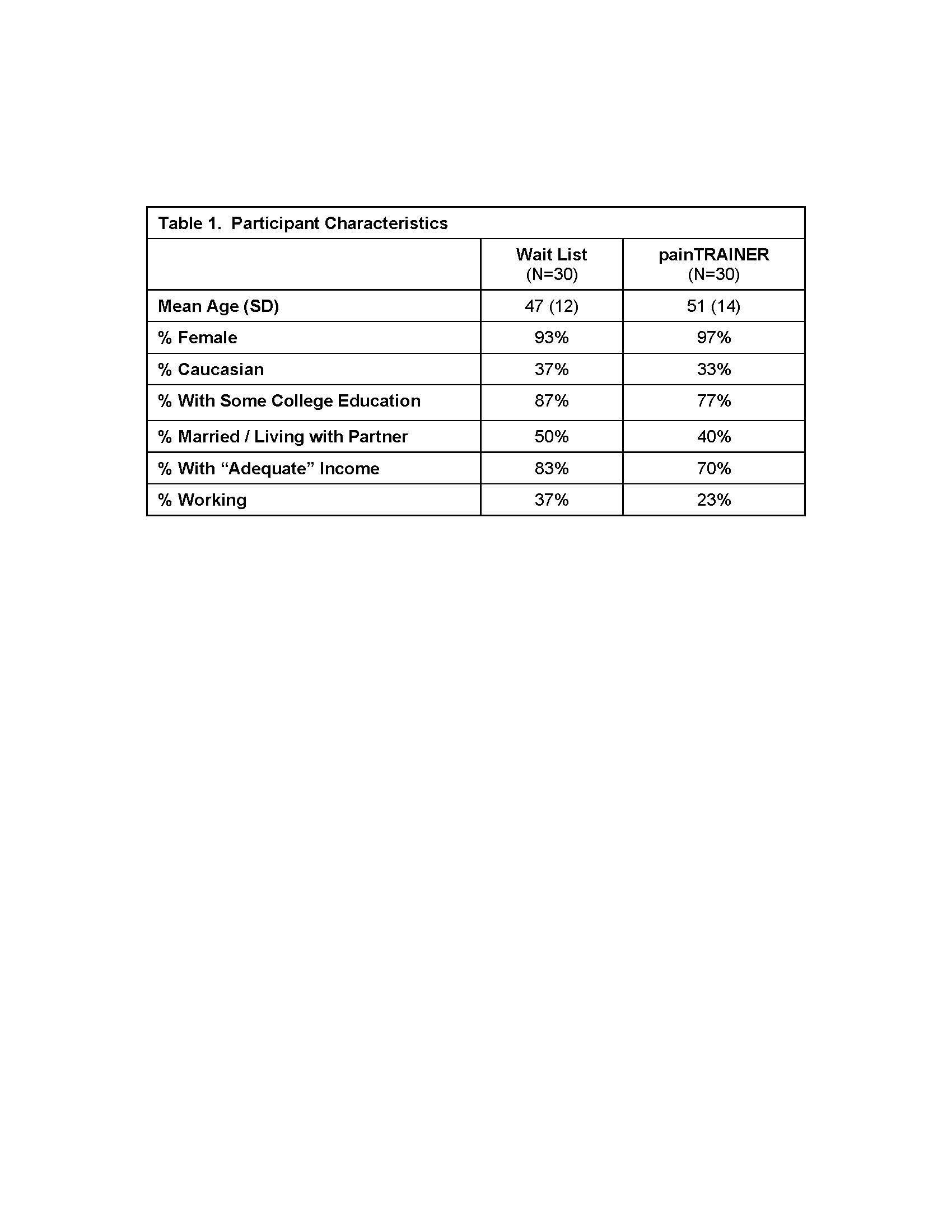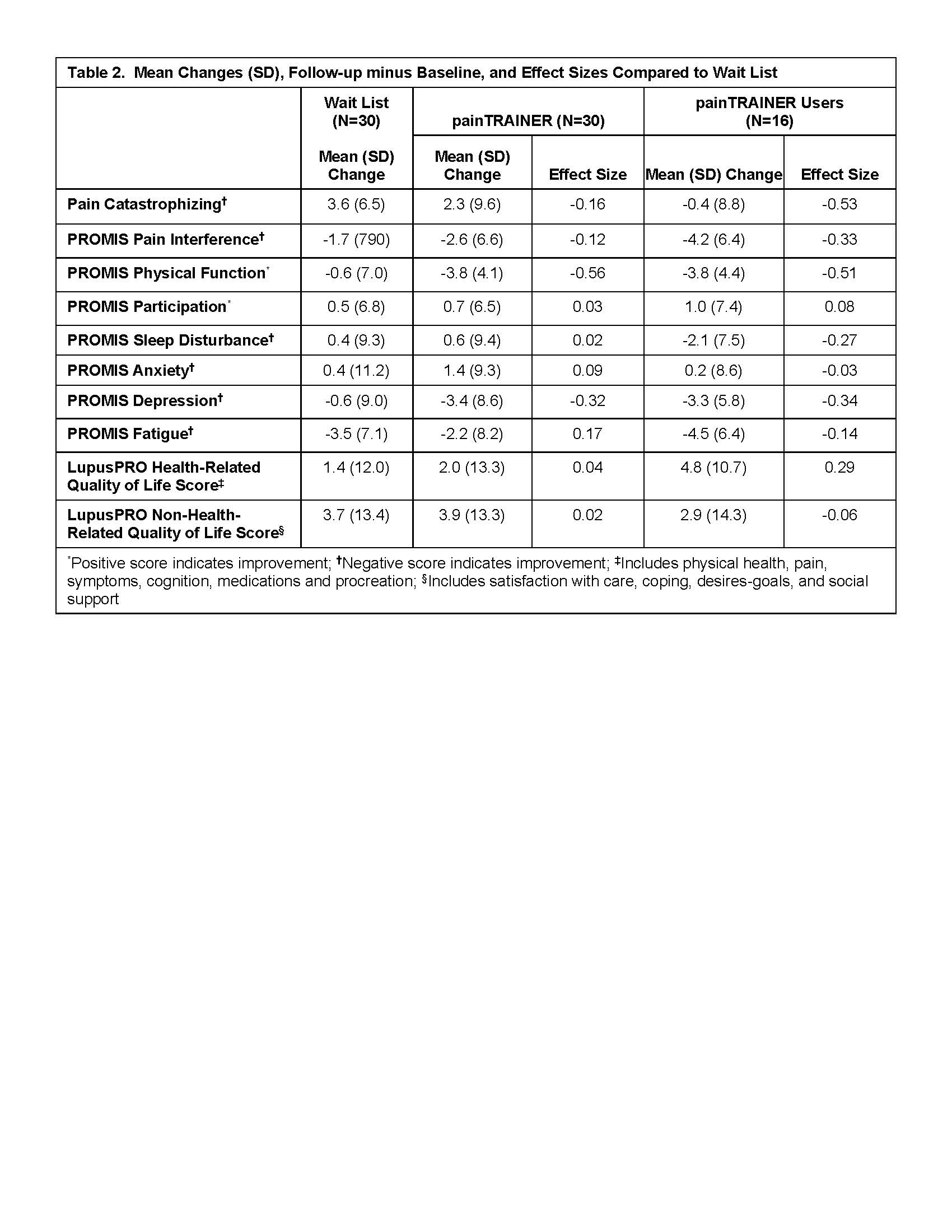Session Information
Date: Sunday, November 8, 2020
Title: Patient Outcomes, Preferences, & Attitudes Poster II: Miscellaneous Rheumatic Diseases
Session Type: Poster Session C
Session Time: 9:00AM-11:00AM
Background/Purpose: Patients with Systemic Lupus Erythematosus (SLE) have increased symptoms of fatigue, chronic pain, depression and anxiety, which are associated with negative impacts on quality of life. Interventions that enhance the use and effectiveness of coping strategies may lead to better physical and psychological outcomes among patients with SLE. Pain coping skills training (PCST) programs have been shown to improve outcomes among patients with other rheumatic conditions, but there have been no trials of PCST among patients with SLE. This study was a preliminary assessment of the feasibility and efficacy of painTRAINER (formerly PainCOACH), an automated, internet-based PCST program, among patients with SLE.
Methods: Participants were 60 individuals with a diagnosis of SLE, identified from electronic medical records of one health care system. Participants were randomly assigned with equal allocation to painTRAINER or a wait list control group. PainTRAINER involves 8 modules; participants were instructed to complete one module weekly, along with practice activities for each cognitive or behavioral coping skill. Outcomes were assessed at baseline and 9-week follow-up, including the Pain Catastrophizing Scale, PROMIS Subscales (Pain Interference, Physical Function, Sleep Disturbance, Anxiety, Depression, Fatigue and Participation), and the LupusPRO quality of life questionnaire. Baseline characteristics and changes in outcomes from baseline to follow up (mean, standard deviation and Cohen’s d effect sizes) were computed for painTRAINER and wait-list control groups.
Results: Participant characteristics are shown in Table 1. Among those randomized to the painTRAINER group, 53% accessed the program (“painTRAINER users”). Most of those who did not access the program stated that they did not receive instructions via email. Table 2 shows changes in study outcomes for the wait list and painTRAINER groups, as well as participants randomized to painTRAINER who did access the program. PainTRAINER users had a small decrease in Pain Catastrophizing (the tendency to ruminate about pain and feel helpless in dealing with it), while participants in the other groups had increases in scores. Participants in the painTRAINER group had greater improvement in PROMIS Pain Interference than the wait list group, with painTRAINER users having the greatest improvement. PainTRAINER users also had more favorable responses than the other groups with respect to PROMIS sleep disturbance, fatigue, and the LuposPRO Health-Related Quality of Life Score.
Conclusion: PainTRAINER users reported meaningful improvements in multiple physical and psychological outcomes, supporting the promise of this program for patients with SLE. Future research in a larger study needs to address tailoring of the content to patients with SLE and improved strategies for patient recruitment, engagement and retention.
To cite this abstract in AMA style:
Allen K, Beuchamp T, Cleveland R, Grimm K, Hu D, Huffman K, Keefe F, Norfleet J, Rini C, Santana A, Saxena Beem S, Sheikh S. Pilot Study of an Internet-Based Pain Coping Skills Training Program for Patients with Systemic Lupus Erythematosus [abstract]. Arthritis Rheumatol. 2020; 72 (suppl 10). https://acrabstracts.org/abstract/pilot-study-of-an-internet-based-pain-coping-skills-training-program-for-patients-with-systemic-lupus-erythematosus/. Accessed .« Back to ACR Convergence 2020
ACR Meeting Abstracts - https://acrabstracts.org/abstract/pilot-study-of-an-internet-based-pain-coping-skills-training-program-for-patients-with-systemic-lupus-erythematosus/


